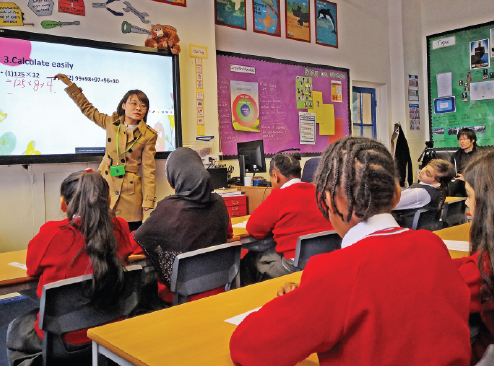UK teachers find Shanghai math adds up
By CECILY LIU | China Daily | Updated: 2019-01-28 09:33

Teachers from China have visited Britain to share tips with educators
Debbie Morgan smiles with pride after a previously underperforming British student gives a correct answer in class after learning math the Shanghai way.
"Shanghai maths embodies a belief that every child can do well if they are taught well, and that is now leading a mindset change in British schools," said Morgan, who is director for primary schools at Britain's National Centre for Excellence in the Teaching of Mathematics, or NCETM.
British schools are embracing Shanghai math teaching methods with ever-increasing enthusiasm. So far, 5,000 of Britain's 16,000 primary schools have adopted Shanghai math teaching methods, and the United Kingdom government has committed 41 million pounds ($54.2 million) to help at least 8,000 schools adopt Shanghai math teaching methods by 2020.
This month, a group of 86 Shanghai math teachers visited more than 40 British primary and secondary schools throughout the UK where they taught British students and exchanged ideas with local teachers. The visiting teachers are the latest to participate in a bilateral government-led exchange program that began in 2014 and that has drawn participation from more than 700 teachers.
The investment is already producing results. A recent study by Shefield Hallam University found students in UK schools who use the Shanghai math method outperformed the national average between 2015 and 2017.
But Morgan said the impact far exceeds measurable math test results. It has cultivated students' passion and confidence in mathematics, and the system's unique techniques that tailor individual help for every student has helped many previously poor-performing pupils catch up with their peers.
Carol Knights, director for secondary schools at NCETM, notes that Shanghai math techniques mean younger students have been able to grasp basic knowledge in a more solid way that ensures they understand more complex content when they are older.
"One current issue in the UK is, often, students who do well at math suddenly find themselves struggling at A-level (the exam taken during the last two years of secondary school). That is because their foundation is not solid enough, and we believe the Shanghai math methods can effectively address that," Knights said.
Shanghai math teaching methods first attracted widespread public attention when Shanghai topped the Organization for Economic Co-operation and Development's program for international student assessment (Pisa) rankings for 15- and 16-year-old students, in 2009 and 2012.
The impressive performance came as the UK government considered how to improve British children's math knowledge. The government decided to adopt some Shanghai math techniques for the British curriculum.
Every year since 2014, groups of British and Chinese teachers have visited each other's schools to share expertise and discuss effective methods. When the latest group of Chinese teachers taught in British schools this month, their lessons were observed by dozens of local teachers who were eager to learn the techniques for their own classes.
Liu Xiaoming, China's ambassador to the UK, said on Friday at a reception at the embassy for the visiting Shanghai teachers that the program has deepened and enriched education partnerships between China and the UK, and enhanced mutual understanding between China and the West.
"As the first large-scale teacher exchange program between China and a Western developed country, this program is of great significance to enhancing exchanges and mutual learning between China and the West," Liu said.
Nick Gibb, Britain's minister of state for schools, said: "The exchange helps to deliver profound and systematic change in our schools, by giving teachers insights into some of the best maths teaching in the world."
But the Shanghai math method is not magic. Knights said it works by encouraging a core emphasis on 'mastery' that ensures students grasp simple concepts before moving onto more difficult ones, and that builds confidence along the way.
"For example, Shanghai maths for Year 1 students will focus on addition and subtraction. But here in the UK, we do a little bit of many things, including addition, subtraction, multiplication, fractions, and measurements. We overload our students. Their learning is too fragile," Knights said.
Liu Jiandong, a Shanghai teacher who has just finished an exchange at London's St Francis de Sales Primary School, said the Shanghai method has a far wider collection of exercises that are well designed to help students of all abilities.
"I call these exercises little 'walking sticks' to help students," the teacher explained. "Our curriculum has a large collection of them, and I would flexibly give out the ones most suitable for each individual child after assessing their classroom progress each day."























